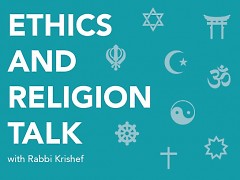Her parents argued that the chemo made her sick, and also that "Our belief is the natural stuff will do just as much as that stuff if it's God's will.” If the parents were members of your faith, how would you counsel them?
Father Kevin Niehoff, O.P., a Dominican priest who serves as Adjutant Judicial Vicar, Diocese of Grand Rapids, responds:
“I would follow the advice of my trusted Dominican brother, Father Kevin O’Rourke, O.P., God rest his soul. This question is not a new ethical dilemma but one that he wrote about in 1983, in an article entitled, ‘Only God Can Heal My Daughter,’ (http://opcentral.org/resources/wp-content/uploads/sites/11/2013/04/83090501.htm).
“My guidance to the parents includes teaching them that ethically it is the family unit that must be fostered and protected. The parents rightfully have the custody and care of their child because they love this child and are entrusted with assisting him or her to become a virtuous human being.
“Parents do not have the right to endanger their child’s life because of religious beliefs, even if the child agrees. All human beings will die, but do not forget there is not only the right but also the obligation to use positive means to prolong life. The parent’s religious beliefs will be respected until it is deemed to manifestly harm the child.
“Parents do have the right to make decisions that are best for the family and the child remembering that the goal of Christian life is the attainment of the Kingdom of Heaven. Treatment may be denied only if the medical therapy will not provide an equal or better quality of life for the suffering individual.”
R. Scot Miller, who writes from an Anabaptist and Quaker Christian perspective, responds:
“There is no need for counsel. Death is not to be feared. To use extraordinary means to keep a child or an adult alive in the face of assured morbidity is a question of faith. Trust in perceived ‘extraordinary measures’ challenges the outcomes attributed to divine sovereignty. To control outcomes in such a crisis is a practice based upon fear of death and denial of God’s sovereignty.
“However, faith and the free practice of religion does not allow any individual or congregation to violate state or federal laws. Americans will overwhelmingly favor most religious freedoms, but they will not overlook the preventable death of a child. Therefore, the Anabaptist must accept that either the child will be taken away from the parents, or, if the child dies, the parents may serve jail time. I would advise parents to act faithfully and accept the consequences of their beliefs, one way or the other.”
Aly Mageed, a Shura member (roughly equivalent to an elder) of the Islamic Mosque and Religious Institute of Grand Rapids, responds:
“There are some guiding principles from Islam that can help in this situation. God created both the disease and its treatment. Meanwhile, accepting and submitting to God’s Will should not lead us to intentionally make the wrong choices. The action is up to us and to God is the outcome. That is the true meaning of God’s Will. Yes, He could cure the medically incurable and He can prevent the known effective treatment from being effective. But that is His Will and its wisdom may or may not be reached in this lifetime.
“How can anyone imagine that one does not need to sow seeds, choose the appropriate conditions, water, fertilize … to get any fruit. One day the Prophet (PBUH) noticed a Bedouin leaving his camel without tying it down. He asked "why do you not tie down your camel?” The Bedouin answered “I put my trust in God." The prophet replied “tie your camel down first, and then put your trust in God.”
“Relying on and trusting God for the desired outcome only comes after doing one’s best in following the required path for success. Otherwise it becomes fatalism and dependence on God to provide without working to achieve sustenance. Putting one’s trust in God only means to accept results after doing one's best. Taking the precautionary measures that could prevent troubles or wrong outcome is part of the process.”
My response:
If this family were members of my community, I would tell them in the strongest possible terms that the only ethical answer under these circumstances is to accept medical treatment. To rely on God’s will and use some sort of ‘natural treatment’ is to ignore the near certainty that God created chemotherapy in partnership with physicians in order to effect cures. If the treatment was extraordinarily painful and if it had only a small chance of a cure, Jewish tradition offers the possibility of patient autonomy (or parental discretion) to refuse treatment. Such is not the case here.
***
This column answers questions of Ethics and Religion by submitting them to a multi-faith panel of spiritual leaders in the Grand Rapids area. We’d love to hear about the ordinary ethical questions that come up on the course of your day as well as any questions of religion that you’ve wondered about. Tell us how you resolved an ethical dilemma and see how members of the Ethics and Religion Talk panel would have handled the same situation. Please send your questions to [email protected].
The Rapidian, a program of the 501(c)3 nonprofit Community Media Center, relies on the community’s support to help cover the cost of training reporters and publishing content.
We need your help.
If each of our readers and content creators who values this community platform help support its creation and maintenance, The Rapidian can continue to educate and facilitate a conversation around issues for years to come.
Please support The Rapidian and make a contribution today.
